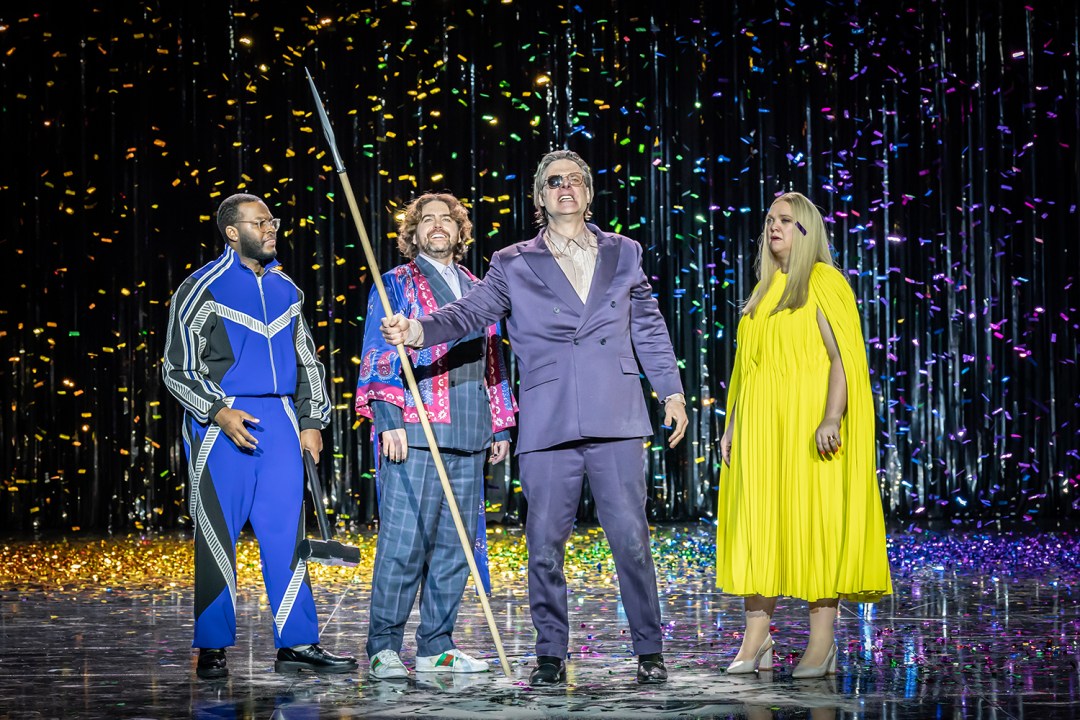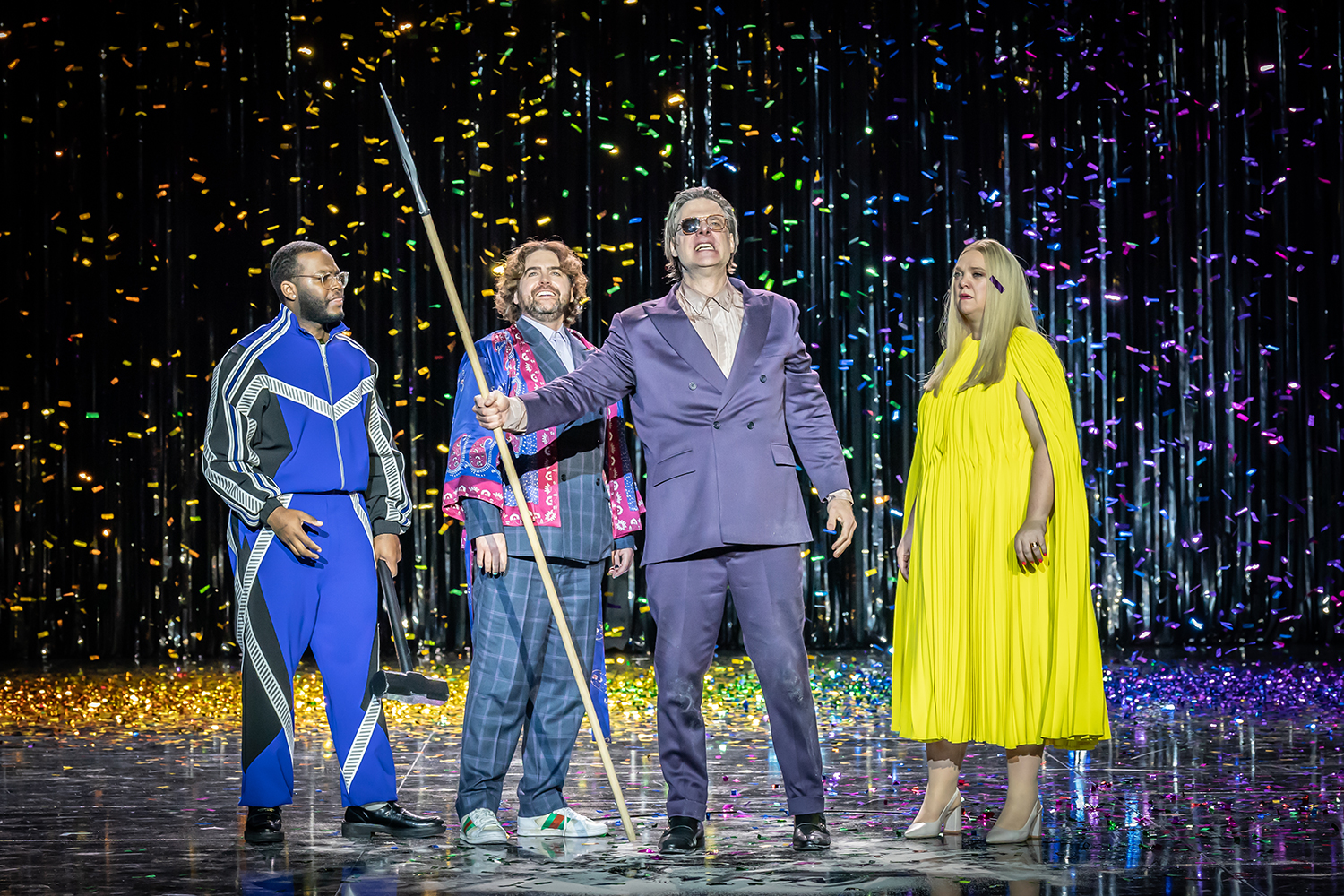Tubas and timpani thunder in The Rhinegold as the giants Fasolt and Fafner, having built Valhalla, arrive to claim their fee: Freia, goddess of beauty and youth. It doesn’t go well. Suddenly Fasolt drops his defences and declares his yearning (the translation is John Deathridge’s) for ‘a woman who’d lovingly and softly live with us lowly mortals’. At those words the music melts, and a solo oboe sings a melody so poignant that Ernest Newman thought it worthy of Mozart. This is the first instance in the whole cosmic drama where Wagner gives us a glimpse, however unformed, of something that an adult human might recognise as love. It’s the first gesture towards the shattering moment in The Valkyrie when Brünnhilde gazes at the doomed and broken Siegmund and realises that his fearful, exhausted sister Sieglinde means more to him than all the glory of heaven.
It’s a moment, in other words, that contains worlds, and there’s no denying that in his new production for English National Opera, Richard Jones runs with it. Fasolt is played, with careworn dignity and an aching, oaken tone, by Simon Bailey, and you’ll rarely see him differentiated more fully from his grimly utilitarian brother. He makes an effort for Freia (Katie Lowe); putting on a tie, and offering a crumpled handkerchief to dab her tears. She, in turn, is presented as a backwards naïf, responding to Fasolt’s tenderness with desperate affection – an idea that receives no overt sanction from Wagner. Her horror at his fate is wrenching.
How this all works in the context of Wagner’s overall dramatic trajectory is another question – though whether that even matters any more is anyone’s guess. Reprieved from an Arts Council death sentence, ENO is now on starvation rations, and no one seriously believes that this Ring cycle will be completed. For all practical purposes, then, this was Rhinegold as a standalone drama. Different rules apply, although those who saw Jones’s botched ENO Valkyrie in 2021 will have found its imagery making slightly more retrospective sense. Rhinegold is the Ring’s exposition; it’s deliberately under-characterised. Some have described it as cartoonish, and while Jones does attempt to rebalance the characters’ emotional development (Wotan’s encounter with the Ring brought him self-awareness very early on: hunched sobbing over his spear), cartoonish was generally what he delivered.
So the action began even before the first note with a hairy naked hominid lugging a tree across the stage. The ascent of man, god, whatever: it got a laugh, and one of the most breathtaking openings in world theatre was undercut by sniggers. The designs (by Stewart Laing) are in Jones’s current favoured style – you might call it crapcore. Poundshop glitter curtains doing duty for the sublime, a general air of 1970s ITV sci-fi (huge ping-pong balls on stilts drifted slowly across the gods’ mountaintop), and costumes from TK Maxx (the Rhine Maidens in neon gym wear). Stage effects were (intentionally) on a school-play level. Alberich (Leigh Melrose, sounding blackly imposing but overacting with manic intensity – presumably at Jones’s instruction) transformed himself into a dragon by nipping offstage, then reeling back on wearing what appeared to be a dead pangolin. There’s no reason why Wagner can’t be profound within a trash aesthetic: Graham Vick’s posthumous Birmingham Rhinegold achieved just that in 2021. But those opening sniggers set the tone. It felt, at times, as if Jones found Wagner’s ideas embarrassing – un-British – and was trying to joke his way around them. Possibly he knows his audience too well. Donner throwing shapes in a designer tracksuit, Fafner backing a rental truck onstage to collect the gold: it’s a larf, innit? And yet the final rainbow was a moment of redemptive wonder that managed to work, superbly, on those same terms. Between the sudden bolts of insight, the genuinely Wagnerian innovations (surround-sound vocal projection in the auditorium when Alberich donned the Tarnhelm), and the determinedly crappy visuals there were intimations that this might have grown into a Ring that was disruptive in all the right ways.
For now, though, Deathridge’s English translation works well, creating a tangible rapport between stage and audience, and the singing, throughout, is strikingly fresh and clear. Incredibly for the Coliseum, nothing ever sounds forced – testament to Martyn Brabbins’s mastery of an orchestra that can nonetheless blaze and roar with hair-raising force. And the cast is excellent: with John Relyea’s commanding, eloquent Wotan matched (less unevenly than is often the case) by Madeleine Shaw’s seductive-sounding Fricka. Frederick Ballentine is Loge; another character whose role takes on a different focus when Rhinegold is a standalone drama. He plays him as a voice of conscience as well as mischief: lucid, engaging and worryingly persuasive. He also wears big goofy green gloves throughout, because – well, we’ve been through this. It’s a Richard Jones production. That’s the deal.







Comments